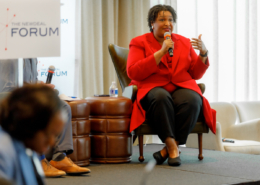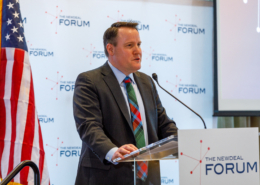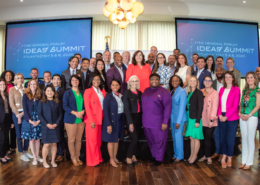Buttigieg Urges Local Officials to Focus on the ‘Politics of the Everyday’
By Dan McCue | The Well News
WASHINGTON —Transportation Secretary Pete Buttigieg made something of a spiritual homecoming on Thursday, delivering what could be interpreted as valedictory remarks to a group that played a critical role in his rise in American politics.
“The moments I remember best and found most helpful about this group often came after regrettable political outcomes,” Buttigieg said shortly after being introduced at the NewDEAL Leaders Conference in Washington.
“So I’m especially glad to be with you right now,” he said, acknowledging the pain many in the room felt in the wake of the 2024 election.
With that, he apologized in advance in case anyone felt he was “tiptoeing” around the election in subsequent remarks.
“It’s only because I’m behaving as a member of the administration and I’m not here in a partisan role,” he said.
Buttigieg has been something of a star of the NewDEAL Leaders since his tenure as mayor of South Bend, Indiana, between 2012 and 2020.
And his esteem within the organization only grew as he emerged as a competitive candidate for the White House in 2020, and later was chosen by President Joe Biden to serve as the nation’s transportation secretary.
On Thursday, he spoke at length about the pride he feels in what the Biden administration accomplished, reminding his listeners there are still two months left to the administration and much work left to do — especially in regard to allocating funding to state and local projects.
But he also offered a possible prescription for how to recover from the queasiness many NewDEALers have been feeling since Nov. 5.
“There are three things I’m pretty sure about,” he said during his opening remarks.
“The first is something that I first said eight years ago, and that I believe even more strongly now — and that is that in a complicated time for our country, our salvation will come from local and state leaders who engage people who actually know each other and work on the delivery of the basic things we expect of our government,” he said.
“The second thing I’m sure of is that information is everything, and we’re not good at it,” Buttigieg continued.
He explained that in his view many public officials simply fail to stay abreast of the different ways in which people are getting their information.
“We’ve got a lot of work to do in that regard,” Buttigieg said, adding that while a Democratic official appearing in a conservative outlet like Fox News is a good thing, “That’s just scratching the surface of what we need to do to find people where they are.
“One of the few realms that is, comparatively, non-ideological and accessed by people from across the spectrum is local broadcast media, where a lot of you find your bread and butter work is done,” he said.
“But a lot of it is literally down to the neighborhood level, and we have got to figure out how to take online conversations offline at scale,” he said.
Buttigieg conceded there’s no obvious way to do that, but argued it’s something that came naturally to most public officials “until about 15 years ago.”
“So it’s something we’re going to have to find ways to do [again],” he said.
He also warned that no matter how raw his listeners felt, raging at President-elect Donald Trump’s perceived outrages won’t be enough to lead Democrats to victory.
“We cannot be mesmerized by the worst things that we see happening,” Buttigieg said.
Though he admitted it’s human nature “to react with shock at things that are done precisely with the intent of shocking us,” he said in such instances “we need to move very quickly through the shock and condemnation to identify exactly what needs to be done.
“That requires a more tactical mentality that, I think, comes more naturally to people who have been in the trenches of state, local and county work than it does sometimes to leaders here in Washington,” he said.
As he took a seat on stage for a conversation with MSNBC host Symone Sanders-Townsend, many gathered in the meeting space on the second floor of the Eaton Hotel were wondering just what Buttigieg, so long a rising star in the Democratic Party, will do once the current administration folds up its tent and goes home.
On that count, the most he would say is that he plans to put “a little distance” between himself and Washington “for a little while.”
“But whatever I happen to be doing professionally, I will do my part to remind folks [how projects funded by Biden initiatives like the Inflation Reduction Act] came about,” he said.
“Even during this administration, there have been plenty of folks [on Capitol Hill] who voted no to this funding, but have not hesitated to claim credit for the projects they voted against,” he said.
“If they’re just rejoicing about the projects, then I will cheer them on,” he continued. “If they’re claiming credit for it, then we have to have a little conversation.”
Aside from that he said, “I know that I will make myself useful later; I just don’t know how.”
In the meantime, Buttigieg said, he and his team at DOT headquarters in the Navy Yard are “working at a feverish pace” to get grants done under the Bipartisan Infrastructure Act, announce the “deserving and qualified” programs that will be receiving them, and moving those grants that have been announced to the “award agreement” stage, the last step in guaranteeing their payout.
“Overall, we’ve got about $570 billion going to 66,000 projects and counting,” the transportation secretary said. “What’s interesting about them is that none of them originated from us.
“All of these projects were brought to us by communities, by states, by transit agencies and airports,” Buttigieg said. “We’re doing everything we can until the bell rings to do our part and partner with them, but now that the funding is there, it will fall to state and local leaders to actually deliver these projects.”
That said, he added, “I remain convinced that the infrastructure law and the rest of President Biden’s Investing in America agenda will eventually come to be known as the ‘Big Deal.’
“We’ve had the New Deal, the Fair Deal and the Square Deal. This is the Big Deal,” he said.
Seeing an opening, Sanders-Townsend gently nudged Buttigieg toward talking about the election at least in an oblique sense, asking for his definition of “working class” America, the group most often identified as having abandoned the Democratic party in 2024.
“First of all, if anybody who regards themselves as working class doesn’t think we have their back, then shame on us,” Buttigieg said. “That means we’ve got work to do.”
“I guess some would argue that talking about the working class is code for white working class people, but I don’t think we should just assume who one is talking about when they use that term,” he said.
“Frankly, I think we’ve thrown labels like that around so much in our political rhetoric that they’ve lost most of their meaning,” he said. “At the same time, one word that we haven’t used a lot is poverty, and a lot of people are in poverty.
“They are poor or low income Americans, White, Black, and Brown … who don’t know if we have their back, and that’s a problem there,” he continued. “The last time I checked, there’s not one county in America where somebody working on minimum wage full time can actually afford an apartment. Again, we’ve got substantive work to do.
“People count on their government to help address their problems and the simple fact is, not enough people have felt that we’ve done that … How we respond to that challenge is a big part of what we have to do going forward, and what we have to get right,” he said.
Buttigieg‘s prescription for the Democratic party at large as well as the local officials in the room, was to remember their job is really about “the politics of the everyday.”
“What does that mean?” he asked rhetorically. “It means always remembering that the point of all this is to make somebody’s everyday life better.
“And that’s true whether we’re talking about literal, bread and butter issues or what are classed as social issues. The reason these things matter is that they matter in somebody’s everyday life,” he said.
“What all of those different things have in common is they’re about everyday life and how it gets better or it gets worse based on the decisions that people in big, white buildings in Washington, D.C. and much closer to home in city hall and everywhere in between, make.
“We have to orient our practice around that — and by practice I mean our rhetoric, of course, but also our work — and not get caught up in all the games played around here,” he said.
Buttigieg acknowledged that might not be easy to do “given all the ‘shiny objects’ that will be cast before the American people on an exhausting hourly basis for the next many years … and there are some things, that morally, you will have to respond to … but you can not let it dominate the agenda,” he said.
As an example, he pointed to incoming Rep. Sarah McBride, D-Del., and her response to a transgender bathroom ban in the Capitol that House Speaker Mike Johnson, R-La.,announced this week.
On Nov. 5, McBride, herself once a NewDEAL Leader, became the first openly transgender person elected to Congress.
McBride responded to the ban via social media by saying: “I’m not here to fight about bathrooms. I came here to fight for my constituents and to bring down costs facing families.”
Buttigieg said McBride’s response to Republicans “reminded everybody that they’re the ones who are worried about where other people go to the bathroom; she’s worried about how to make life more affordable for people who live in Delaware.”
He argued that this put Republicans on the defensive.
“This isn’t some high school model Congress. This is the House of Representatives, the body that writes the laws that we all live by,” Buttigieg said. “Let the speaker of the House … explain how, in a country that has crises ranging from the character of its democracy to the affordability of its housing, why he is spending one second of his time policing where one of his congressional colleagues gets to go to the bathroom.”
“There’s something called the politics of everyday life, and that’s what we’ve got to get back to,” he added.
Before he left, Buttigieg thanked the NewDEAL, “not just for having me now, but for everything that this organization has meant to be over the years.
“I really think I would not have had the chance to do what I’m doing now, and so many of the things I was proudest to get to do, were it not for the friendships that I formed here,” he said.
“First of all, finding a group that was actually enthusiastic about talking smart sewers with me was a revelation when I was a new mayor, and then when I got it into my head to seek the DNC chair role, and many, many moments since then, I have turned to the people of this organization again and again for ideas, for nourishment, and for encouragement,” Buttigieg said. “I’m really thankful that we got to spend a little more time together.”






